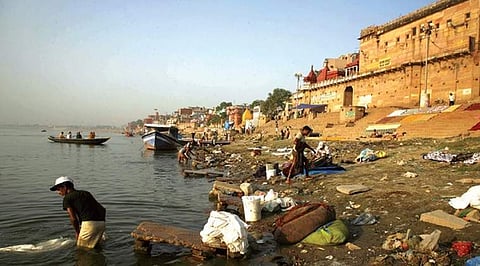

NEW DELHI: GD Agrawal, also known as Swami Gyan Swaroop Sanand, hasn’t eaten since June 22.
On July 10, about 20 people, including policemen, forcefully dragged him from Matri Sadan Ashram in Haridwar, where he was observing fast, into an ambulance to Dehradun-based Doon Hospital.
Later, on July 12, he was shifted to AIIMS, Rishikesh. During his eleven-day stay at AIIMS, doctors attempted to feed him through the drip. However, they failed.
Since 2008, Agrawal has been engaged in indefinite hunger strikes demanding the Central government to honour its promise to protect the river Ganges. This is his sixth strike, which the 86-year-old claims to be his last.
“This is a fast unto death,” says Agrawal. Agrawal’s association with the river is since his childhood “because of his grandmother”. However, his devotion towards Ganges grew as its importance unfolded before him at various stages of life — as a former chair of the Department of Civil and Environmental Engineering at IIT, Kanpur, first member secretary to the Central Pollution Control Board and consultant on river’s health.
The 2,525-km holy river is increasingly choked by dams, drained by irrigation canals, and fouled by industrial, agricultural, and human waste. The sorry state the river was progressing towards came alive to the engineer during his visit to Gangotri in 2006, after which “save Ganges became sole purpose of his life”.
In a bid to prevent the construction of hydroelectric dams on the Bhagirathi river — a headstream of Ganges — Agrawal engaged in three hunger strikes between 2008 -2010. The promises, however, remained unfulfilled. In July 2010, when the Centre decided to resume work on several hydroelectric plants on the Bhagirathi River, Agrawal went without food for 34 days. The then minister for environment, forests and climate change Jairam Ramesh personally represented the government in dialogue with the environmentalist and agreed to cancel dam projects on the river’s upper reaches.
However, the government continued construction of dams in certain areas and his fight continued. In 2012, he stepped down from his role as a board member of National Ganga River Basin Authority, calling it a sham.
Over the years, Agrawal has grown as a national figure. However, he says, he opts to sit in for a hunger strike as the “don’t have masses with him”.
At present academia-turned-swami is pressing for four demands, including enactment of a Ganga Protection Management Act and halting hydropower projects along the tributaries of Ganga, Alakanda and Mandakini.
“If the draft is enacted by Parliament, most of the problems of Ganga ji would be resolved for a long time. The present government can use their brut majority and whip it. I will break my fast the day it is passed,” Agrawal said and added, “This is my last responsibility. If they are able to get it passed before the draft passed in the next session, then good. If not... many people die unhappy. It’s time for the future generation to take responsibility for the holy river.”